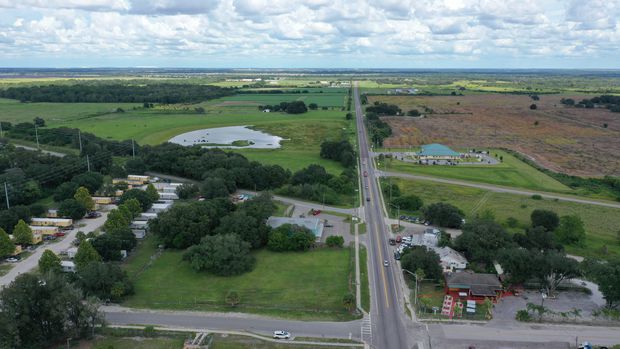To discourage sprawl, a Hillsborough County commissioner wants to change a rule for new home developers.
BY C.T. BOWEN
Times Staff Writer
Hillsborough County wants to eliminate the 26,000 septic tanks inside its urbanized core. In the spring, it asked the state for $5 million to help. Commissioners also approved a four-year rate increase for its utility customers, in part, to start converting up to 500 homes annually from septic to central sewer service. But, now commissioners are kicking around an idea that could end up encouraging more septic systems in other parts of the county.
Last week, Commission Chairwoman Pat Kemp advocated for eliminating the county rule requiring developers to provide central water and sewer service as a precursor to increasing home-building density in the vicinity of Balm and Wimauma, rural enclaves in southern Hillsborough.
“I think we should abolish that requirement,” said Kemp. “We should just get rid of it.”
In areas like Wimauma and Balm that are outside the urban service area, new home construction is limited to one home per five acres. Developers, however, can circumvent that cap, increasing density ten-fold, if they provide necessary infrastructure like connections to the county’s central water and sewer service. In essence, Kemp argued, the county’s own policy is encouraging the sprawl of small-sized home lots clustered together by the hundreds because developers need the additional density to offset the upfront infrastructure costs.
“We should not be driving it through our regulations, I don’t believe, in either Balm or Wimauma,” Kemp said. “I think it’s driving too much of the clustering and too much of the development that we shouldn’t be doing.” Her comments during a June 17 workshop came as commissioners continued to wrestle with land-planning policies amid the looming expiration of a moratorium on new rezoning applications in the Balm and Wimauma areas. There was community consensus on goals related to buffering and lighting, according to Plan Hillsborough, but commissioners noted the heavy-lifting on such items as job requirements, affordable housing incentives, community benefits and connectivity remained incomplete.
Kemp raised her idea two weeks before the start of the new state budget year that includes more than $1.4 billion in state dollars and federal stimulus aid for Everglades restoration and water quality projects, including septic tank conversions, statewide. Her suggestion drew mixed reactions from other commission members, some of whom worried about environmental issues tied to septic tanks.
“I’m having a problem with that risk,” said Commissioner Kimberly Overman, “that if it’s not managed well, it may be a challenge.” Environmental advocates voiced similar sentiments. “Septic tanks pollute by design,” said Terry Gibson of Jensen Beach, government affairs director for the American Water Security Project, which advocates for recycling water. “It will increase nutrient pollution, pathogen pollution in and around nearby water bodies.”
But Commissioner Stacy White, whose district includes Balm and Wimauma, offered a counterpoint.
“I think Commissioner Kemp is on to something there,” said White, who suggested the septic tank requirement could be a strong negotiating point to try to find consensus among residents, owners of large parcels of land and developers on changes to the land plan. State law requires a minimum of a half-acre lot to accommodate septic tank service. Kemp said developers could still install the central water and sewer service, at their own expense, for their
projects, but she said the county mandate was counter-productive.
The estimated cost for providing central water and sewer can range from $5,000 to $10,000 per home depending on such factors as the size of the lot, the amount of piping and the efficiency of the lift station, said Willy Nunn, president and CEO of Homes by WestBay. He, too, panned the idea.
“As counterintuitive as it might seem, I’m going to go with the environment on this one,” said Nunn.
The draft land-use study for Balm, known as residential planned or RP2 in government vernacular, is scheduled to be previewed for residents at 5 p.m. today at Reddick Elementary School, 325 West Lake Dr., Wimauma. The Wimauma community plan update will be presented at 10 a.m. Saturday at Beth-El Farmworker Ministry, 18240 U.S. Highway 301, Wimauma. Commissioners are scheduled to consider the proposals, as proposed amendments to the county’s comprehensive land plan, on Aug. 5.
And while Kemp’s idea didn’t bring ringing endorsements, most acknowledged the outside-the-box thinking. “It’s a departure of how the (Balm area planning) has been set up historically,” said Melissa Zornitta, executive director of the Planning Commission. “But there are a number of things we know historically about the (plan) that have not worked.”

